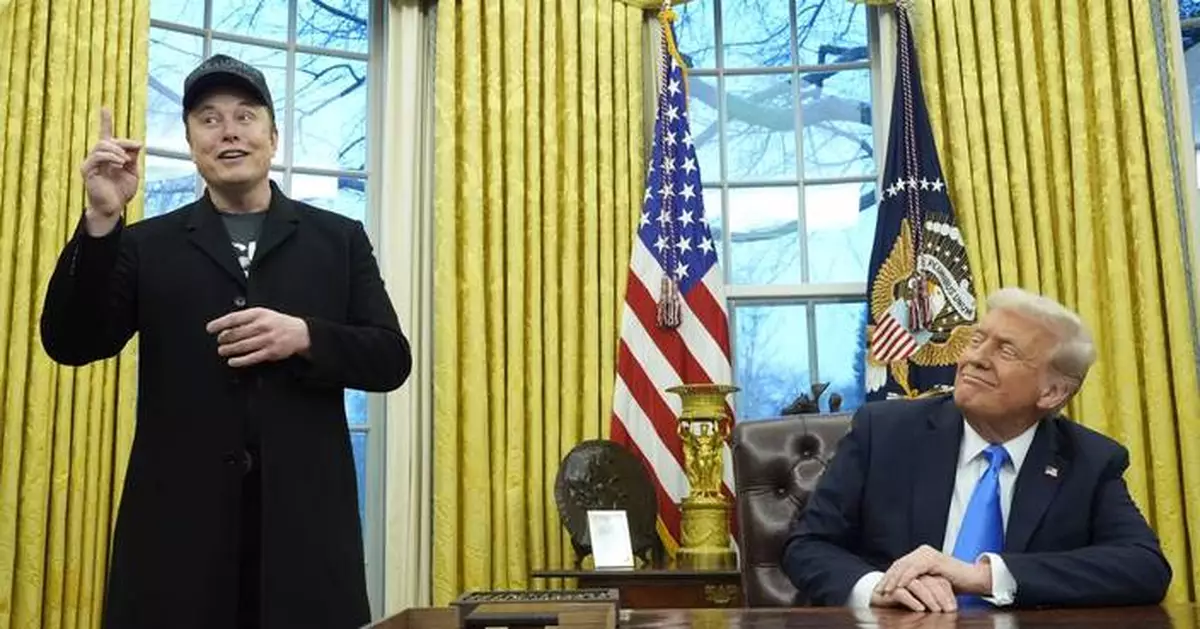WASHINGTON (AP) — A federal appeals court on Tuesday rejected a Trump administration push to reinstate a sweeping pause on federal funding, a decision that comes after a judge found the administration had not fully obeyed an earlier order.
The Boston-based 1st U.S. Circuit Court of Appeals turned back the emergency appeal, the latest in a string of court losses that is increasingly frustrating top administration officials as it slows President Donald Trump’s wide-ranging agenda.
The appeals court also said it expected the lower court judge to clarify his original order. The Trump administration quickly pushed to withhold Federal Emergency Management Agency money sent to New York City to house migrants, saying it had “significant concerns” about the spending under a program appropriated by Congress.
The Justice Department had previously asked the appeals court to let it implement sweeping pauses on federal grants and loans, calling the lower court order to keep promised money flowing “intolerable judicial overreach.”
U.S. District Court Judge John McConnell in Rhode Island is presiding over a lawsuit from nearly two dozen Democratic states filed after the administration issued a boundary-pushing memo purporting to halt all federals grants and loans, worth trillions of dollars. The plan sparked chaos around the country.
The administration has since rescinded that memo, but McConnell found Monday that not all federal grants and loans had been restored. He was the first judge to find that the administration had disobeyed a court order.
Money for things like early childhood education, pollution reduction and HIV prevention research has remained tied up even after his Jan. 31 order halting the spending freeze plan, the states said.
McConnell, who was appointed by former President Barack Obama, ordered the Trump administration to “immediately take every step necessary” to unfreeze all federal grants and loans.
He also said his order blocked the administration from cutting billions of dollars in grant funding from the National Institutes of Health, a move announced last week.
The Justice Department said McConnell's order prevents the executive branch from exercising its lawful authority, including over discretionary spending or fraud.
“A single district court judge has attempted to wrest from the President the power to ‘take care that the laws be faithfully executed.’ This state of affairs cannot be allowed to persist for one more day,” government attorneys wrote in their appeal.
The states, meanwhile, argued that the president can’t block money that Congress has approved, and the still-frozen grants and loans are causing serious problems for their residents. They urged the appeals court to keep allowing the case to play out in front of McConnell.
Judges have also blocked, at least temporarily, Trump’s push to end birthright citizenship for anyone born in the U.S., access to Treasury Department records by billionaire Elon Musk’s Department of Government Efficiency and a mass deferred resignation plan for federal workers.
The Republican administration previously said the sweeping funding pause would bring federal spending in line with the president’s priorities, including increasing fossil fuel production, removing protections for transgender people and ending diversity, equity and inclusion efforts.
A different federal judge in Washington has also issued a temporary restraining order against the funding freeze plan and since expressed concern that some nonprofit groups weren’t getting their funding.
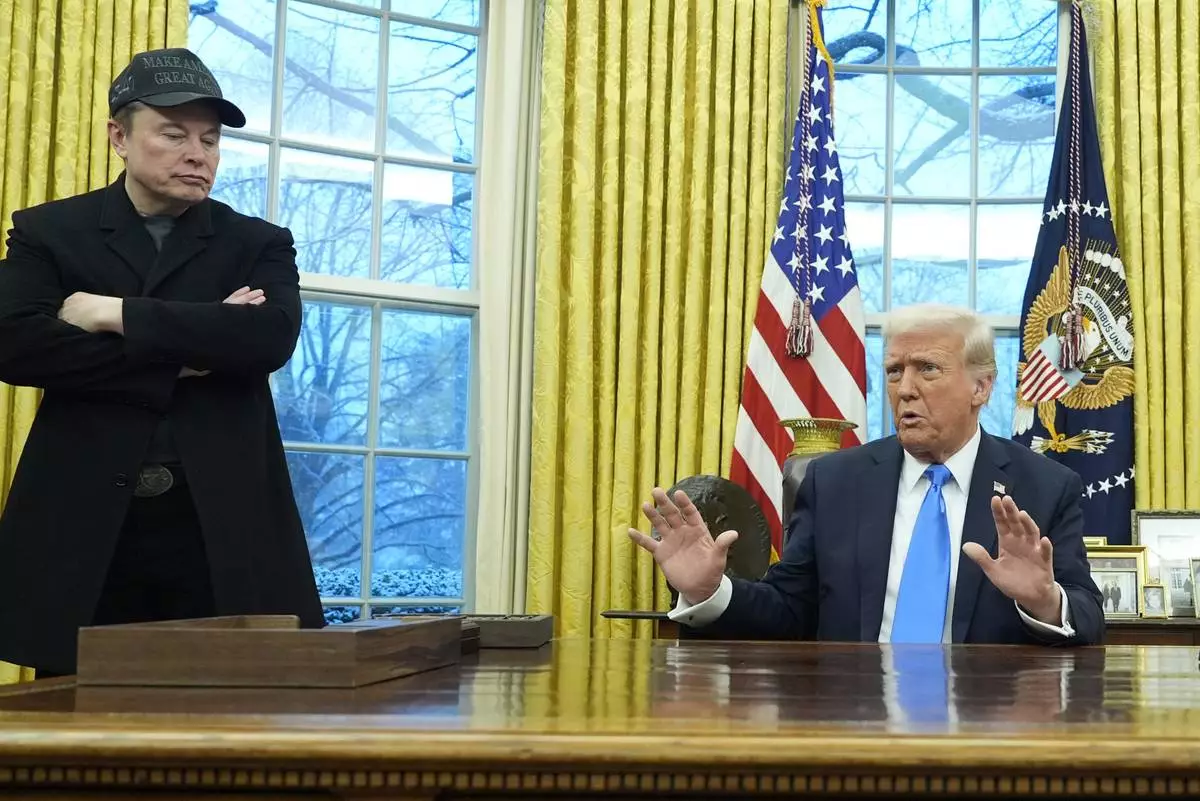
President Donald Trump speaks with reporters as Elon Musk listens in the Oval Office at the White House, Tuesday, Feb. 11, 2025, in Washington. (Photo/Alex Brandon)
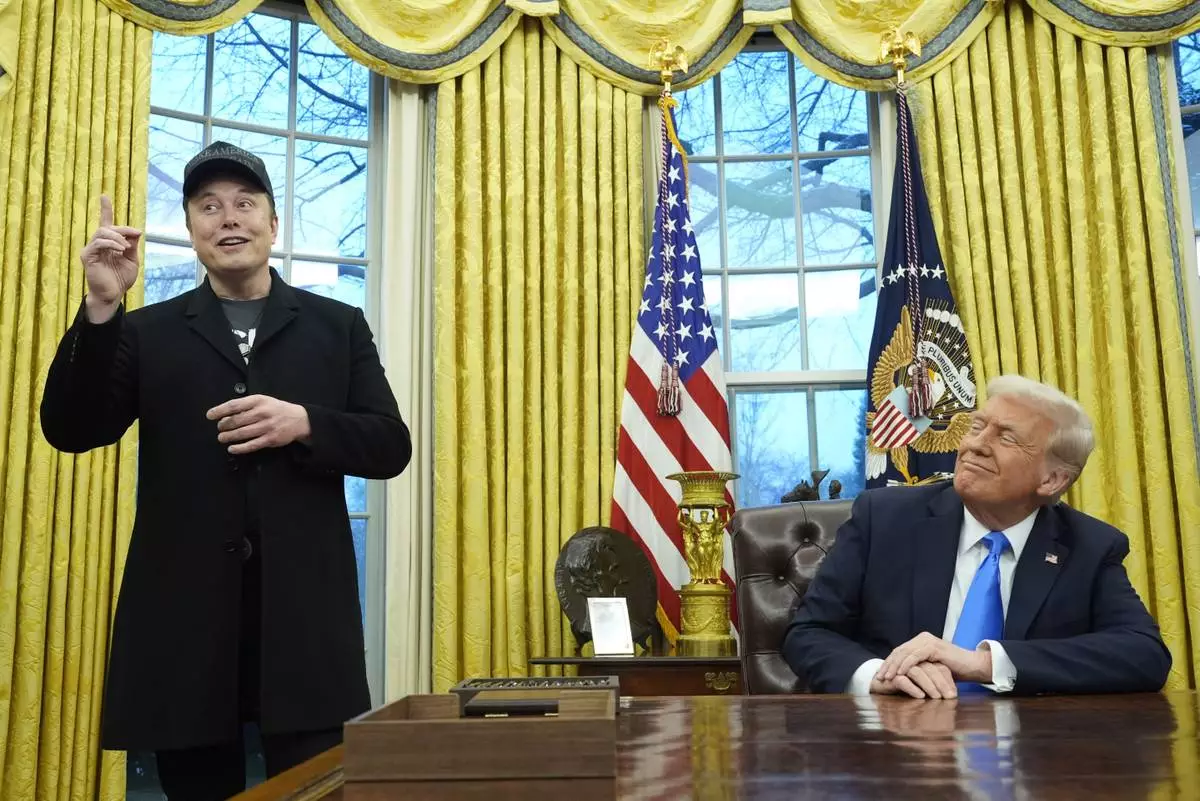
President Donald Trump listens as Elon Musk speaks in the Oval Office at the White House, Tuesday, Feb. 11, 2025, in Washington. (Photo/Alex Brandon)
DUBAI, United Arab Emirates (AP) — U.S. President Donald Trump said Iran wants to negotiate with Washington after his threat to strike the Islamic Republic over its bloody crackdown on protesters, a move coming as activists said Monday the death toll in the nationwide demonstrations rose to at least 544.
Iran had no immediate reaction to the news, which came after the foreign minister of Oman — long an interlocutor between Washington and Tehran — traveled to Iran this weekend. It also remains unclear just what Iran could promise, particularly as Trump has set strict demands over its nuclear program and its ballistic missile arsenal, which Tehran insists is crucial for its national defense.
Meanwhile Monday, Iran called for pro-government demonstrators to head to the streets in support of the theocracy, a show of force after days of protests directly challenging the rule of 86-year-old Supreme Leader Ayatollah Ali Khamenei. Iranian state television aired chants from the crowd, who shouted “Death to America!” and “Death to Israel!”
Trump and his national security team have been weighing a range of potential responses against Iran including cyberattacks and direct strikes by the U.S. or Israel, according to two people familiar with internal White House discussions who were not authorized to comment publicly and spoke on condition of anonymity.
“The military is looking at it, and we’re looking at some very strong options,” Trump told reporters on Air Force One on Sunday night. Asked about Iran’s threats of retaliation, he said: “If they do that, we will hit them at levels that they’ve never been hit before.”
Trump said that his administration was in talks to set up a meeting with Tehran, but cautioned that he may have to act first as reports of the death toll in Iran mount and the government continues to arrest protesters.
“I think they’re tired of being beat up by the United States,” Trump said. “Iran wants to negotiate.”
He added: “The meeting is being set up, but we may have to act because of what’s happening before the meeting. But a meeting is being set up. Iran called, they want to negotiate.”
Iran through country's parliamentary speaker warned Sunday that the U.S. military and Israel would be “legitimate targets” if America uses force to protect demonstrators.
More than 10,600 people also have been detained over the two weeks of protests, said the U.S.-based Human Rights Activists News Agency, which has been accurate in previous unrest in recent years and gave the death toll. It relies on supporters in Iran crosschecking information. It said 496 of the dead were protesters and 48 were with security forces.
With the internet down in Iran and phone lines cut off, gauging the demonstrations from abroad has grown more difficult. The Associated Press has been unable to independently assess the toll. Iran’s government has not offered overall casualty figures.
Those abroad fear the information blackout is emboldening hard-liners within Iran’s security services to launch a bloody crackdown. Protesters flooded the streets in the country’s capital and its second-largest city on Saturday night into Sunday morning. Online videos purported to show more demonstrations Sunday night into Monday, with a Tehran official acknowledging them in state media.
In Tehran, a witness told the AP that the streets of the capital empty at the sunset call to prayers each night. By the Isha, or nighttime prayer, the streets are deserted.
Part of that stems from the fear of getting caught in the crackdown. Police sent the public a text message that warned: “Given the presence of terrorist groups and armed individuals in some gatherings last night and their plans to cause death, and the firm decision to not tolerate any appeasement and to deal decisively with the rioters, families are strongly advised to take care of their youth and teenagers.”
Another text, which claimed to come from the intelligence arm of the paramilitary Revolutionary Guard, also directly warned people not to take part in demonstrations.
“Dear parents, in view of the enemy’s plan to increase the level of naked violence and the decision to kill people, ... refrain from being on the streets and gathering in places involved in violence, and inform your children about the consequences of cooperating with terrorist mercenaries, which is an example of treason against the country,” the text warned.
The witness spoke to the AP on condition of anonymity due to the ongoing crackdown.
The demonstrations began Dec. 28 over the collapse of the Iranian rial currency, which trades at over 1.4 million to $1, as the country’s economy is squeezed by international sanctions in part levied over its nuclear program. The protests intensified and grew into calls directly challenging Iran’s theocracy.
Nikhinson reported from aboard Air Force One.
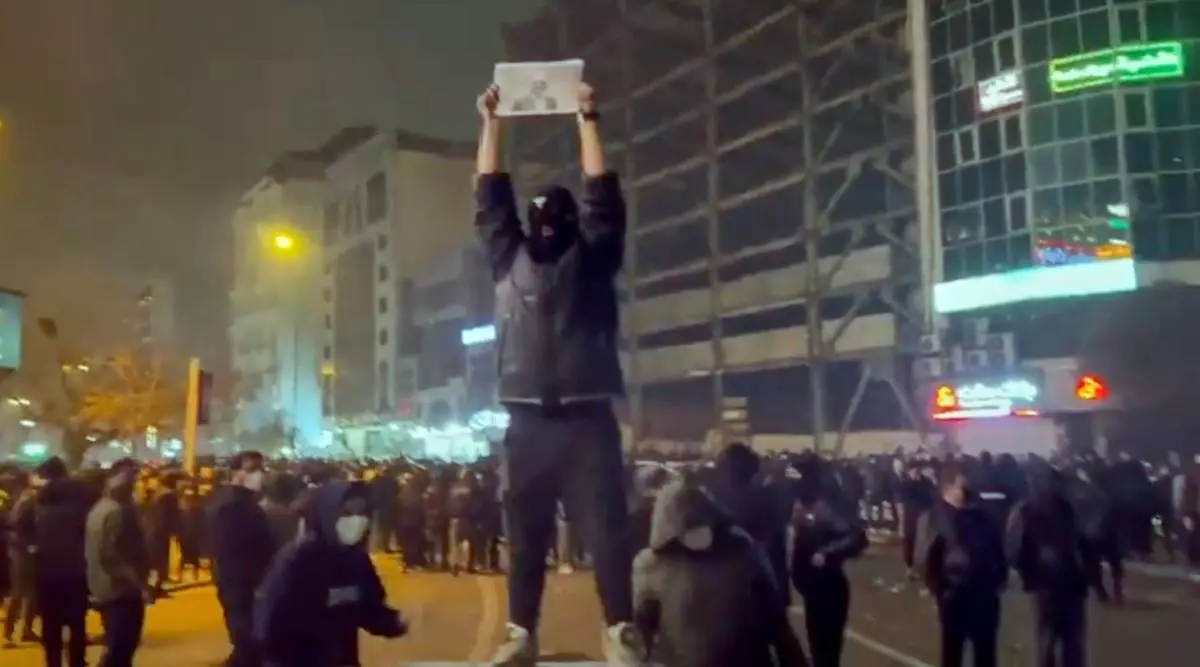
In this frame grab from video obtained by the AP outside Iran, a masked demonstrator holds a picture of Iran's Crown Prince Reza Pahlavi during a protest in Tehran, Iran, Friday, January. 9, 2026. (UGC via AP)
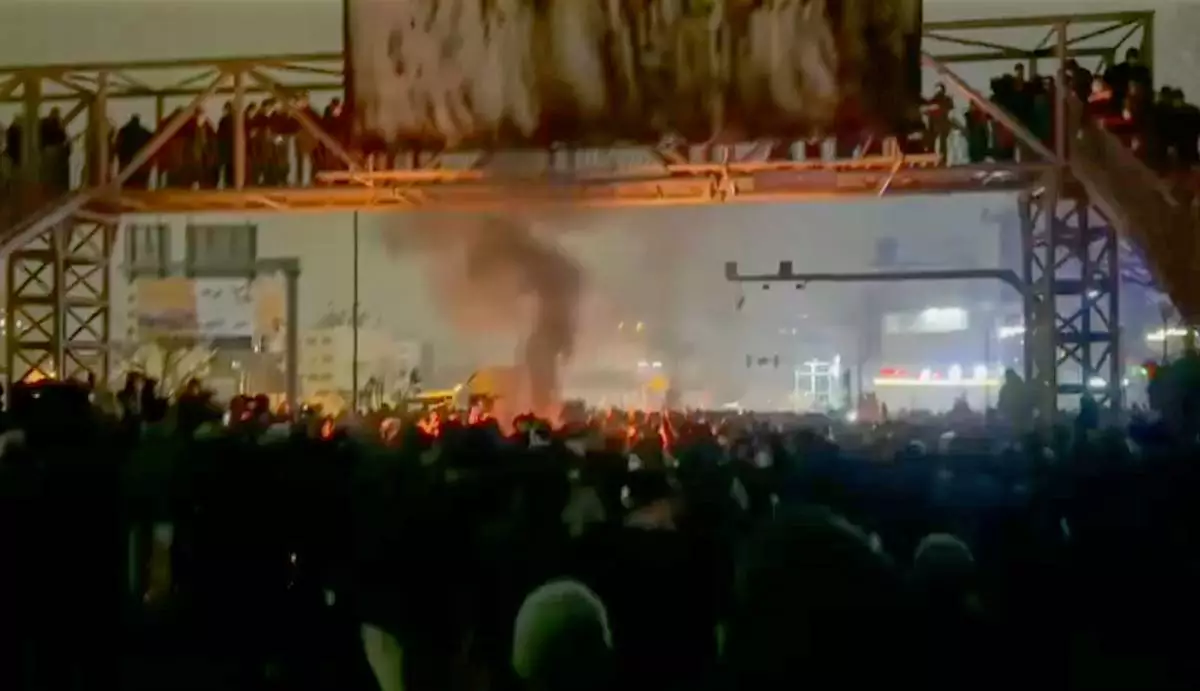
In this frame grab from footage circulating on social media from Iran shows protesters taking to the streets despite an intensifying crackdown as the Islamic Republic remains cut off from the rest of the world in Tehran, Iran, Friday, Jan. 9, 2026.(UGC via AP)
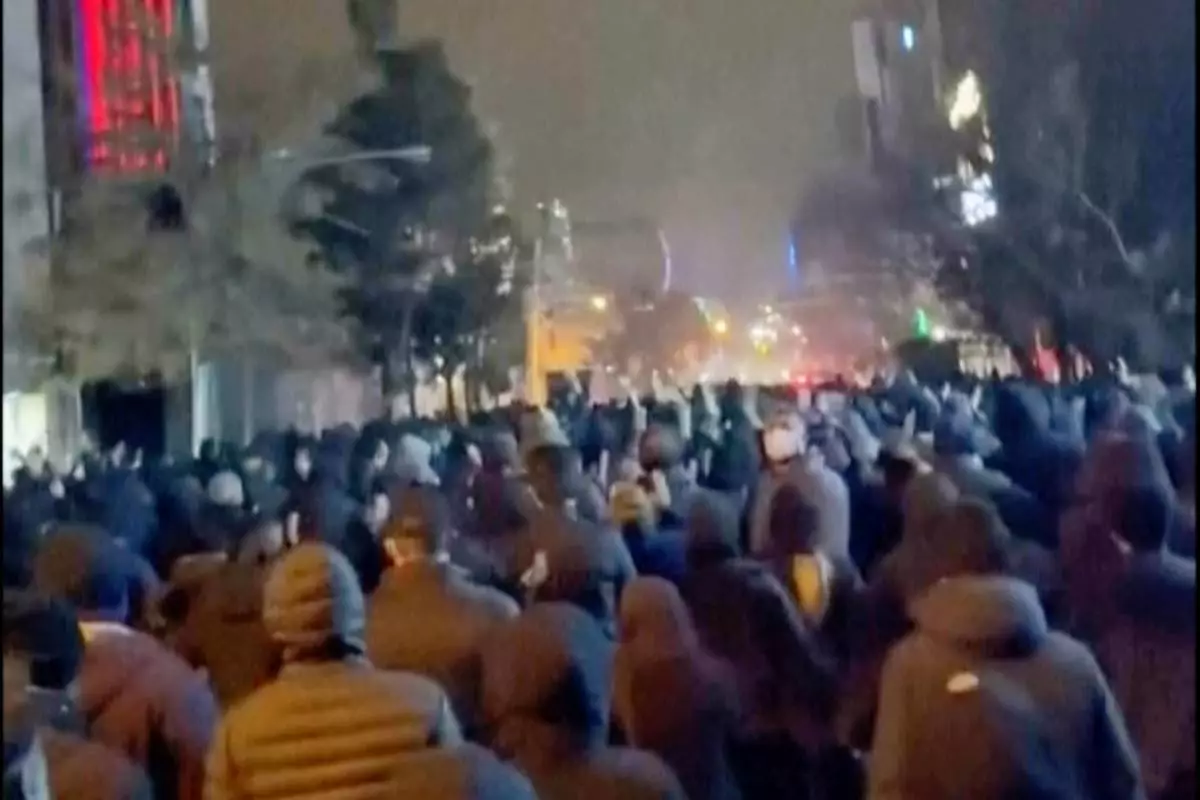
In this frame grab from footage circulating on social media from Iran showed protesters once again taking to the streets of Tehran despite an intensifying crackdown as the Islamic Republic remains cut off from the rest of the world in Tehran, Iran, Saturday Jan. 10, 2026. (UGC via AP)




